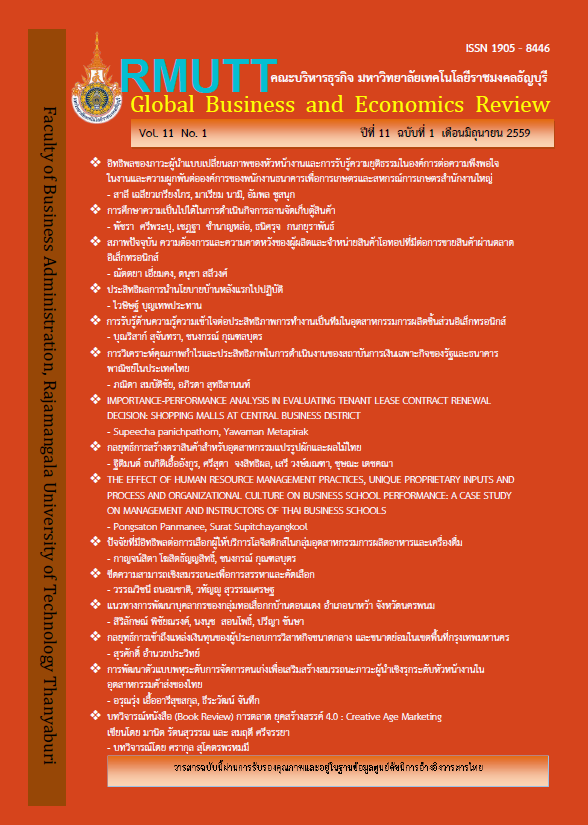DEVELOPMENT OF THE MULTILEVEL TALENT MANAGEMENT MODELING FOR BUILDING TRANSFORMATIONAL LEADERSHIP CAPABILITY OF CHIEF IN WHOLESALE INDUSTRY OF THAILAND
Keywords:
Talent Management Building, Transformational Leadership, Capability Social NetworksAbstract
This research aims to examine components in a multilevel talent management model for building transformational leadership capability of chief in the wholesale Industry of Thailand by applying documentary research technique classified by organizational and individual levels. This documentary research explored the related concepts and theories and then synthesized and summarized them into the tables. It applied the social networks concepts by using the Pajek program for the analyses of components and relationship of the multilevel talent management model for building transformational leadership capability. The results were 1) a structure casual model at the organizational level is comprised of talent management, effective team, leadership development, organizational climate, and transformational leadership and 2) a structure casual model of the individual level is comprised of personality, creativity, organizational citizenship behavior, management skills, and transformational leadership.
References
แคทลียา ศรีใส. “ความสัมพันธ์ระหว่างภาวะผู้นำการเปลี่ยนแปลงกับการสร้างทีมงานของผู้บริหารโรงเรียน เอกชน สำนักผู้ตรวจราชการประจำเขตตรวจราชการที่ 3.” วิทยานิพนธ์ปริญญาการศึกษามหาบัณฑิต บัณฑิตวิทยาลัย มหาวิทยาลัยบูรพา, 2548
วิชญะ ประกรรษวัต. “ลักษณะทีมงานด้านนโยบายของเทศบาลนครพิษณุโลก.” วิทยานิพนธ์ปริญญารัฐ ประศาสนศาสตร์มหาบัณฑิต มหาวิทยาลัยขอนแก่น, 2551
เสรี พงศ์พิศ. (2546). แผนชีวิต เศรษฐกิจชุมชน. กรุงเทพมหานคร: ภูมิปัญญาไท
เสรี พงศ์พิศ. (2548). เครือข่าย: ยุทธวิธ เพื่อประชาคมเข้มข้น ชุมชนเข้มแข็ง. กรุงเทพมหานคร: โครงการ มหาวิทยาลัยชีวิต สถาบันการเรียนรู้เพื่อปวงชน.
สุวิชชา สุทธิธรรม. อิทธิพลของบุคลิกภาพแบบห้าองค์ประกอบของผู้นำต่อผลงาน ความไว้วางใจในตัวผู้นำ และความคาดหวังที่จะเติบโตในงานของผู้ตาม โดยมีความเป็นผู้นำแบบนักปฏิรูปของผู้นำเป็นตัวแปรส่งผ่าน. วิทยานิพนธ์ปริญญาศิลปศาสตรมหาบัณฑิต สาขาจิตวิทยาสังคม มหาวิทยาลัยจุฬาลงกรณ์, 2553
อรุณรุ่ง เอื้ออารีสุขสกุล และธีระวัฒน์ จันทึก (2558). “การบริหารจัดการคนเก่งเชิงกลยุทธ์: ปัจจัยสำคัญสู่ความได้เปรียบทางการแข่งขันอย่างยั่งยืน” Veridian E-Journal. 8 (3): 1096-1112
อรุณรุ่ง เอื้ออารีสุขสกุล และธีระวัฒน์ จันทึก (2559). “ภาวะผู้นำการเปลี่ยนแปลง : เปลี่ยนความท้าทายก้าว สู่ความสำเร็จขององค์การอย่างยั่งยืน” Veridian E-Journal. 9 (1)
อภิชาติ ไตรธิเลน. (2550) “สภาพการทำงานเป็นทีมในโรงเรียนที่ส่งผลต่อประสิทธิผลการบริหารงานทั่วไปในโรงเรียน สังกัดสำนักงานเขตพื้นที่การศึกษาสกลนครเขต 1.” วิทยานิพนธ์ครุศาสตร์มหาบัณฑิต มหาวิทยาลัยราชภัฎสกลนคร, 2554
อุราภรณ์ คูนาเอก. “ทักษะการบริหารของผู้บริหารที่ส่งผลต่อการนิเทศในโรงเรียน สังกัดสำนักงานเขตพื้นที่การศึกษากาญจนบุรี เขต 1” วิทยานิพนธ์ปริญญาศึกษาศาสตรมหาบัณฑิต สาขาวิชาการบริหารการศึกษา บัณฑิตวิทยาลัย มหาวิทยาลัยศิลปากร, 2554
อโนชา วันแต่ง. “ความสัมพันธ์ระหว่างวัฒนธรรมองค์การเชิงสร้างสรรค์ความสามารถในการปฏิบัติบทบาทด้านการบริหารของหัวหน้าหอผู้ป่วย พฤติกรรมการเป็นสมาชิกที่ดีขององค์การกับผลการดำเนินงานของกลุ่มงานพยาบาลตามการรับรู้ของพยาบาลประจำการ.” วิทยานิพนธ์ปริญญาพยาบาลศาสตรมหาบัณฑิต (วิชาการบริหารการพยาบาล) มหาวิทยาลัยจุฬาลงกรณ์, 2551
Abraham, C., and Asher, T., (2006). The relative importance of the top management team's managerial skills. International Journal of Manpower. 27(1): 9 - 36
Ajay, K. J., Sabir I.G., and Cary L.C., (2013). Perceived organizational support as a moderator in the relationship between organisational stressors and organizational citizenship behaviors. International Journal of Organizational Analysis 21 (3): 313 – 334
Anca, S., and Marcela, A. (2014). Talent Competitiveness and Competitiveness through Talent. Procedia Economics and Finance 16: 506-511
Anika, D., Astrid, C. H., Diana, B., Sven C. V., and Daniela, G., (2015). Transformational leadership sub-dimensions and their link to leaders' personality and performance. The Leadership Quarterly. 1-26
Ashton, C., & Morton, L. (2005). Managing talent for competitive advantage. Strategic HR Review, 4(5): 28-31.
Bass, B.M. and Avolio, B.J., (1994). Improving Organization Effectiveness Through Transformational Leadership. (Thousand Oak: Sage).
David, G.C., and Kamel, M. (2009). Strategic talent management: A review and research agenda. Human Resource Management Review 19: 304-313
Gubman, E.L. (1998). The Talent Solution: Aligning Strategy and People to Achieve Extraordinary Results. United States: The McGraw-Hill Companies.
Ibraiz, T., and Randall S. S., (2010). Global talent management: Literature review, integrative framework, and suggestions for further research. Journal of World Business 45: 122-133
Jon, A.A., (2006). Leadership, personality and effectiveness. The Journal of SocioEconomics 35: 1078–1091
Marin, A.; and Wellman, B. (2011). Social Network Analysis: An Introduction. In The SAGE Handbook of Social Network Analysis. Edited by J. Scott & P. J. Carrington. pp. 11-25. London: SAGE
Michaels, E., Handfield-Jones, H., & Axelrod, B. (2001). The war for talent. Boston: Harvard Business School Press.
Mohammed, I.A., and Farhad, A., (2003). Managerial Skills and SMEs’ Developments in Palestine Career Development International. 8 (7): 367 – 379
Neil, A., Kristina, P., and Jing, Z., (2014). Innovation and Creativity in Organizations: A State-ofthe-Science Review, Prospective Commentary, and Guiding Framework activity. Journal of Management. 40 (5): 1297–1333
Oussama, S., and Gholam, A. S. (2014). Factors affecting virtual team performance in telecommunication support environment. Telematics and Informatics 31: 459-462
Peter, C., (2008). Talent Management for the Twenty-First Century. Harvard Business Review 3: 1-9
Shadi, E.M., and 0Noor, A.M. , (2015). New approach to leadership skills development (developing a model and measure), Journal of Management Development. 34 (7): 821 – 853
Steve, N., (2012). Preparing our leaders for the future. Strategic HR Review. 11(1): 5 – 12
Sumi, J., (2014). Transformational leadership and psychological empowerment. South Asian Journal of Global Business Research 3(1): 18 – 35
Wenhui, Z., Hui, W., Craig, L. P. (2014). Consideration for future consequences as an antecedent of transformational leadership behavior: The moderating effects of perceived dynamic work environment The Leadership Quarterly 25 (2): 329–343
V. Batagelj and A. Mrvar, Pajek-Analysis and Visualization of Large Networks in Graph Drawing Software, Springer Berlin Heidelberg, pp. 77–103, 2004.
Yalcin, V., Pelin, V., & Abdullah, A. (2012). The Effects of Using Talent Management With Performance Evaluation System Over Employee Commitment. Social and Behavioral Sciences, 58, 340-349.
Downloads
Published
How to Cite
Issue
Section
License
The articles published in this journal are the intellectual property of their respective authors.
The views and opinions expressed in each article are solely those of the individual authors and do not reflect the positions of Rajamangala University of Technology Thanyaburi or any of its faculty members. All components and content of each article are the sole responsibility of the respective authors. In the event of any errors, the authors shall bear full responsibility for their own work.








